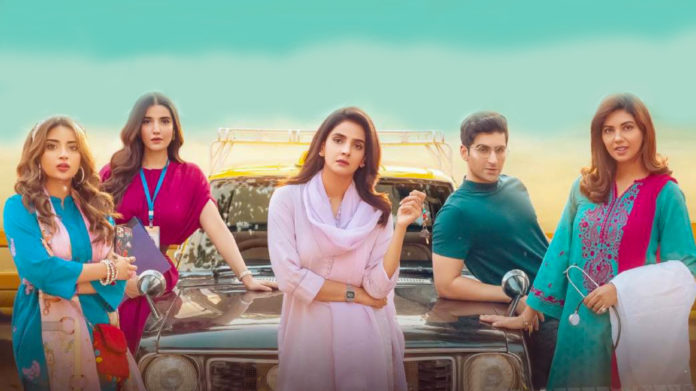Produced under the banner of iDream Entertainment, Sar-e-Rah was directed by Ahmed Bhatti and written by Adeel Razzaq. The mini series comprised of six episodes and starred Hareem Farooq, Saboor Aly, Sunita Marshall and Muneeb Butt in prominent roles alongside Saba Qamar as the central character.
Saba Qamar as Rania in Sar-e-Rah
A superstar and the prolific actress that she is, Saba Qamar plays Rania, a young, headstrong woman who takes charge of her own life after her father falls ill. With not much education on her hand, Rania takes up driving her father’s cab, with dreams of her own.
Here is Rania, a strong, modern woman, who, rather than succumbing to the circumstances, gets up and decides to do something about her situation. along the way, Rania meets several other women and a transgender male, whom she empowers with her thoughtfulness and insight.
Sar-e-Rah Shows Women Empowerment in a Realistic Manner
Sar-e-rah did not bring about the story of women who shattered glass ceilings but took a more realistic, believable and subtle approach to awaken the same desire in women. The drama brought about stories of four women who refused to back out and highlighted the issue of intersex children and their treatment in our society.
This was perhaps one of the very few dramas on national television that focused on a father supporting his intersex child, educating him and letting him discover his own identity, away from the preconceived notions of our society.
What is beautiful about Sar-e-rah is the fact that this approach was subtle and heart warming. Without bombarding the audience with the rightful treatment of the intersex, the drama beautifully portrayed how a father needs to stand with his child, offering understanding and love where needed to create a path of independence and opportunities for the child, once he grows up. Intersex or not, the father-child relationship shown in Sar-e-rah was absolutely the finest portrayals of such on our televisions.
Creating Awareness
From awareness about laws of family inheritance for women, to how female workers take charge of their own lives and step down on harassment, Sar-e-rah tackled multiple issues, hushed in our society. Kudos to the writer Adeel Razzaq for creating such a well knitted story that sent across its purpose, without having to attach any frills.
In an industry that has for long peddled that family politics is what runs best on television, a drama like Sar-e-rah and the audience’s reception to it, will certainly lead to better things in the future. The audience is getting sensible and woke enough to demand strong content, hopefully such that focuses on the real and evolving face of the Pakistani society.
Our Verdict
Call it Feminism or Women Empowerment, but the portrayal of such content like Sar-e-rah on Pakistan television – an industry which is known to be dominated by males and run on content that focuses on family politics – has started transforming this misogynistic society of ours.
Even though the change is not yet very apparent and even though it will take time for the society to evolve as a whole, the good thing is that we have moved on from the decades drenched in gender discrimination. Change is slow but is maturing and it will be imminent one day.




